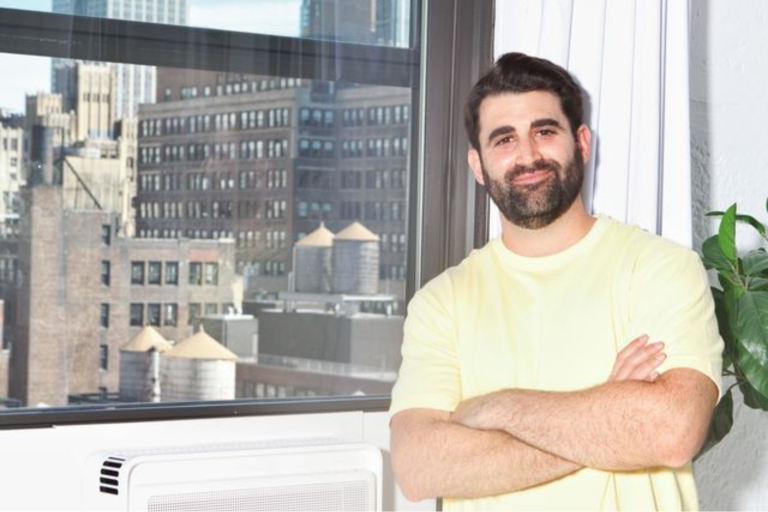Mike Mayer is the co-founder and co-CEO of Windmill, a company devoted to improving indoor air quality with innovations in air conditioners, fans, and filters.
Mayer will share his entrepreneurial journey with us live during an intimate Entrepreneur+ Subscribers-Only Event on February 19th at 3 PM ET. He’ll be breaking down 10 powerful, budget-friendly strategies to test your product ideas effectively, and taking your questions live. Not a subscriber? Join Entrepreneur+ today to access the call and all our premium content for just $5. Click here to sign up.
In advance of that chat, we spoke with Mayer to understand how he built his business and get his best advice for founders looking to launch their dream businesses.
Please give us the elevator pitch for Windmill.
I’m Mike Mayer, co-founder and co-CEO of Windmill, a modern air care brand bringing enhanced performance, technology, and design to the category. We started by reimagining the outdated window AC experience and have since expanded into high-design, high-performance air products like fans and air purifiers.
What inspired you to create this business?
The inspiration came from a personal experience. My brother, Danny, was moving apartments, and I was helping him move. We realized how horrible the window AC experience was — from choosing the right unit to installing it to figuring out what to do with the old one. Our co-founder, Ryan, who comes from a third-generation HVAC family, helped us out, and we realized most people don’t have an expert on-call like we did. We saw an opportunity to make a better, smarter solution.
Related: How This Couple Built the Fastest-Growing Kids Meal Delivery Company in America
What has been your biggest challenge and how did you pivot to overcome it?
The biggest challenge has been learning to separate my personal identity from the business. In the early days, every high felt like the greatest success, and every setback felt like a personal failure. Bad reviews, supply chain issues, or unexpected hurdles hit me hard. I had to learn how to work passionately without getting lost in the highs and lows — a process that took time, but ultimately made me a stronger and more resilient leader.
What advice would you give entrepreneurs looking for funding?
Tap into your network first — friends, family, and early believers who understand your vision. Angel investors, accelerator programs, and crowdfunding platforms can also be great starting points. If you’re going for institutional funding, look for VCs who specialize in your industry and understand your market. But even before all this, ask yourself if you even need funding! Can you bootstrap the early concept? Can you grow slowly and build to profitability on your own? Raising money isn’t the end all be all.
What’s your advice for preparing for a pitch meeting?
Here’s what I do. I’m not saying this is the only way, but it works for me.
- Be yourself: I used to get so nervous before pitches and try to be the most eloquent, polite, and put-together version of myself. Not that I’m a slob now, but I remind myself to loosen up and be authentic. Ultimately, investors are investing in you as much as the idea behind the company so show them who you actually are!
- Be prepared: Know your numbers — unit economics, marketing metrics, market size, etc. – and do a lot of trial runs with your partners or other mentors/advisors. They’ll be able to poke holes and help you think through the tough questions you’ll inevitably get. Pro tip: If you don’t know something, get back to them and be honest that you don’t know.
- Be a good storyteller: People invest in vision as much as numbers. Frame your business as a compelling story in 10-15 slides — among other things, highlight why the concept matters, why you’re the one to do it, and why now is the right time to do it.
What does the word “entrepreneur” mean to you?
One of my friend’s dads is a writer and always compares what I do to being an artist — I’ve come to love and appreciate that comparison. Entrepreneurship, like art, is a process of creation, requiring vision, patience, and the courage to bring something new into the world. Just as an artist refines their work through trial, error, and persistence, entrepreneurs build and shape their businesses over time, learning from failures and making adjustments along the way. The final product — whether a masterpiece or a thriving company (hopefully!) — is the result of dedication, creativity, and an unwavering belief in the process.
What is something many aspiring business owners think they need that they really don’t?
You don’t need to wait until everything is “just right.” Get a prototype out there, gather feedback, and iterate. Also, you don’t need a massive marketing budget for most ideas — some of the best early traction comes from scrappy, creative tactics — or just getting your friends and family to spread the good word!
What is a book you always recommend?
I love Unbroken by Laura Hillenbrand. It’s a testament to the resilience, grit, and power of the human spirit. Louis Zamperini endured unimaginable hardships — surviving a plane crash, drifting for weeks at sea, and enduring brutal captivity — yet he never gave in. If I’m feeling overwhelmed or frustrated at work, I try to think of Louis and remind myself that strength is built in tough moments and that we humans can endure a lot! Not that my or other entrepreneurial problems are even close to those that he had to go through.
Is there a particular quote or saying that you use as personal motivation?
I turn to Theodore Roosevelt’s The Man in the Arena speech for motivation and to fire myself up. Entrepreneurs face constant doubt and negativity, and it’s a powerful reminder that most critics aren’t the ones taking risks. If you’re willing to put yourself and your ideas out there, that alone is enough.
Read the full article here









